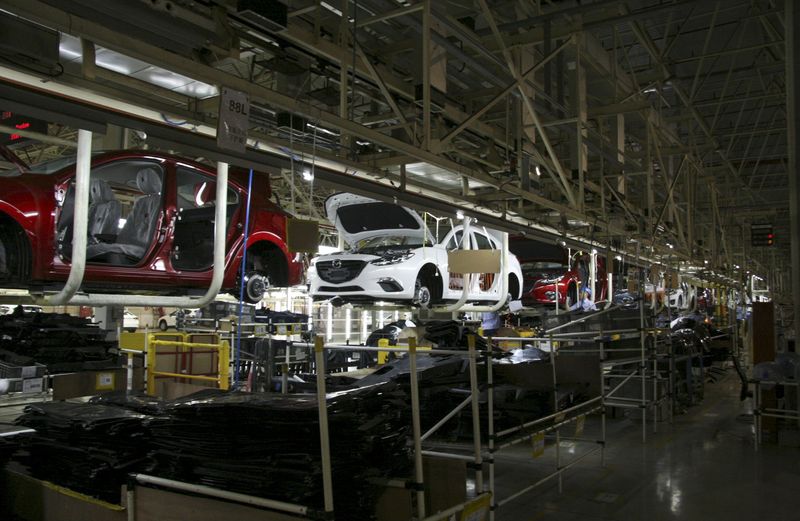By Jonathan Cable and Ian Chua
LONDON/SYDNEY (Reuters) - Economic headwinds facing Chinese manufacturers intensified last month, with conditions deteriorating to their weakest level in two years, while euro zone factories largely shrugged off Greece's brush with bankruptcy.
July was a fraught month for the global economy, with Athens and its creditors taking debt talks to the brink, while Chinese ructions triggered slides in commodity prices - hitting countries reliant on demand from the world's second-biggest economy.
China's factory activity shrank more than initially estimated in July as new orders fell, dashing hopes the economy may be steadying, a private survey showed on Monday.
The final Caixin/Markit China Manufacturing PMI came in at 47.8 in July, from 49.4 in June. A similar official survey at the weekend was also weaker than expected, suggesting growth had stalled.
Both indicators signalled a slowdown in factory activity at a time when Beijing has been intervening heavily to prevent a full-blown crash in the country's stock markets.
"They are distorted numbers due to the stock market panic. If that's the case, it's a transitory dip and given the amount of stimulus that has been put in place, we should expect a bounce back in the August numbers," said ING economist Tim Condon.
"But the economy can hardly afford much of a headwind, so probably it brings forward the timing of when people expect the next (policy) move from the authorities."
China's central bank has already cut interest rates four times since November and repeatedly loosened restrictions on bank lending in its most aggressive stimulus campaign since the global financial crisis.
But a senior Chinese central bank official predicted downward pressure on the economy will persist in the second half of the year, saying growth in infrastructure spending and exports were unlikely to pick up.
Similar business activity surveys for Taiwan, South Korea and Indonesia - all heavily reliant on Chinese demand - reflected varying degrees of weakness that is clouding hopes for a convincing global recovery in the second half of the year.
The frosty state of China saw South Korean exports fall for a seventh month in July, while economic growth in Taiwan cooled to its slowest in three years in the second quarter.
"In terms of external demand, loose monetary conditions and lower energy prices should support a pick-up in global activity in the coming quarters," Krystal Tan, Asian economist at Capital Economics wrote in a report.
"However, the pace of recovery is likely to be gradual, suggesting a strong rebound in Asia's export performance is still some way away."
Providing a bit of relief, manufacturing activity in Japan and India both picked up in July thanks to new orders, though analysts questioned if the momentum can be sustained.
Later on Monday a PMI for the United States will give more clues as to whether the world's biggest economy has healed enough to withstand its first expected increase in interest rates since 2006.
POSITIVE SIGNS IN EUROPE
There were positive signs for activity in Europe, however, which European Central Bank policymakers are likely to welcome. The Netherlands, Spain and Italy all grew at a decent pace, with the latter at its fastest in over four years.
French factories slipped back into contraction, though, while those in Germany registered only modest growth.
"It's not a bad thing to happen - a bit of rebalancing away from the core into the periphery," said Alan Clarke at Scotiabank. "It's doing OK, it should be doing better but there's scope that it will come."
Perhaps unsurprisingly, Greece's survey signalled the steepest downturn in its 16-year history as its banks were shut for most of the month.
Markit's final Eurozone Manufacturing Purchasing Managers' Index was 52.4, comfortably above the 50 level that separates growth from contraction. It beat a preliminary estimate of 52.2 but was just shy of June's 52.5. [EUR/PMIM]
British manufacturing growth picked up in July but new orders grew at the slowest pace in nearly a year, suggesting manufacturers would continue to drag on growth. [GB/PMIM]
The Markit/CIPS PMI rose more than forecast to 51.9. That was up from 51.4 in June - its lowest in over two years - but well below an average of 54.3 recorded since April 2013, when Britain's economy was starting its recovery.

With emerging economies on track to post their smallest share of global growth in years the hope is for continued recovery in the U.S. and Britain, but mixed data in recent weeks has added to doubts about whether they are on a sounder and sustainable footing.